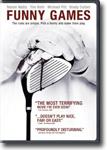 |
|
|||||||||||||||||||||||||||||||||||||||||||||||||||||||||||||
Beginning with the title, there is nothing remotely clever or valuable about this nearly word-for-word remake of director Michael Haneke's own 1997 German film. Two young men intrude on the quiet serenity of a waterfront community as a couple drives to their vacation home, sailboat tethered to their car. As they play "name-the-composer" of classical music on their car CD player, the nearly illegible credits are overtaken by a cacophony of screaming music, the harsh, demanding beat a hint of the chaos to come. While George (Tim Roth) and his son, George Jr., put the boat in the water, Ann (Naomi Watts) is interrupted by a young man, Peter (Brady Corbet), asking to borrow eggs for a neighbor. By the time Ann realizes her discomfort with this young man's presence, another has come into the foyer: Paul (Michael Pitt), clearly the leader of the two. Both exhibit a prep-school confidence, and both are wearing white gloves, the first clue of more sinister intentions. When George and his son arrive, the family is systematically brutalized by Peter and Paul, who conduct their cruelty with a smug insouciance that implies privilege and absolute power over the helpless family. The film soon slips into a series of brutal acts, Pitt occasionally breaking sequence to ask a question of the viewer, an implied participation in the unfolding events. Bear in mind that Funny Games Watts, the producer, bears more weight in this endeavor, her character moving like a wind-up toy going in circles, defeated by a lack of imagination or survival instinct. The lobotomized-by-fear family is easy prey to young men who sadistically destroy their illusions. But even the young men are facile, one-dimensional creatures, their brutality casual and uninspired. Worse yet, the film assumes the viewer is complicit in the unfolding events, including Paul's occasional aside to the audience. And there is a mystifying scene where Paul takes the TV remote and rewinds the action of the last seconds, erasing a shooting that suggests the family might have even a fighting chance. This aberration is never explained, intimating the absolute fatalism of the film. So why would a viewer watch such a film? That is a question that occurs to me: I am as stupefied as Anna, incapable of looking away, although I can't believe the audacity of a movie that offers nothing more than sadism and the crushing power of brutality. I feel patronized and manipulated. It is this snide complicity that ultimately offends me the most, sheer bad taste in the guise of satire. Tim Roth deserves better and Naomi Watts should know better. Sadism without context is valuable only to the most cynical fan of this genre. |
|
|||||||||||||||||||||||||||||||||||||||||||||||||||||||||||||
|
||||||||||||||||||||||||||||||||||||||||||||||||||||||||||||||
| action | animation | art house/international | comedy | documentary | drama | family | horror/sci-fi | suspense | television | ||||||||||||||||||||||||||||||||||||||||||||||||||||||||||||||
| contact | home | ||||||||||||||||||||||||||||||||||||||||||||||||||||||||||||||


